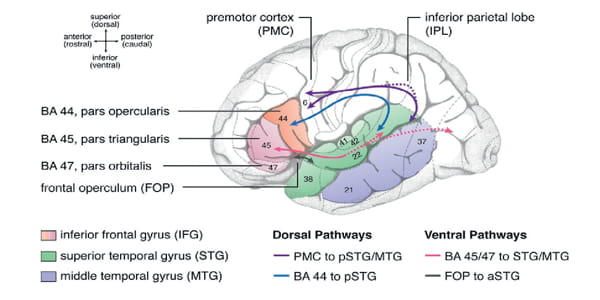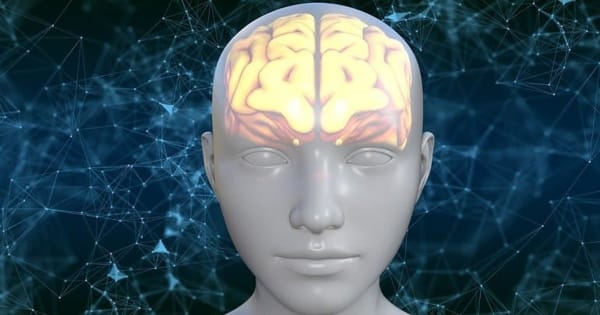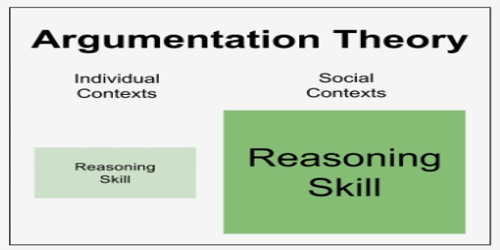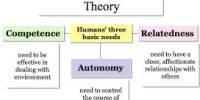Language, as a cognitive process, is linked to neural mechanisms, many of which differ from those found in other brain systems. As evidence, we can see patients with brain lesions who have language disorders but no other discernible problems, as well as patients who have no language problems but many other problems.
The motor cortex is a brain region that is known to control the voluntary movements of the body. However, a team of neuroscientists has now demonstrated that it can also aid in the translation of foreign language words into one’s native language. Their research was recently published in the prestigious Journal of Neuroscience.
Concrete nouns, which have strong visual and mnemonic associations, activate left-hemisphere brain regions associated with visual and associative functions in semantic tasks. The inferior frontal cortex, posterior middle temporal cortex, medial temporal lobe regions including the hippocampus and surrounding cortex, lateral anterior temporal cortex, posterior cingulate cortex, and superior dorsolateral prefrontal cortex are all areas of activation.
A transcranial magnetic stimulation study revealed the motor cortex may play a role in translating foreign language words into one’s native tongue.
The study
Over four days of training, participants in the study learned foreign language words by performing semantically related gestures. Following the training, the participants were asked to translate the words they had learned into their native language.
Transcranial magnetic stimulation (TMS), a neuroscience technique in which magnetic pulses stimulate specific brain areas, was used to interfere with motor cortex processing during the translation task.
The researchers discovered that this interference slowed the translation of words learned through gestures. This slowing was not observed in response to the control TMS, which has no effect on motor cortex processing. In a separate control condition, participants learned foreign language words by looking at pictures, and their translation was unaffected by TMS applied to the motor cortex.

The results
After only a short period of gesture-based training, the motor cortex contributed to the translation of foreign language vocabulary, implying that performing gestures may be a useful tool for learning new words in a foreign language more quickly.
“Intriguingly, the effect was observed for both concrete words like violin and abstract words like democracy. “Taken together, the findings suggest that our memory for recently learned foreign language words is affected by the sensorimotor context in which the words were encountered during learning,” explains first author Brian Mathias.
“Many commonly used teaching methods for learning new foreign language vocabulary, such as studying written word lists, rely solely on audio or visual information. Our findings explain why learning techniques that integrate the body’s motor system outperform these other learning strategies.”
Abstract
Following sensorimotor-enriched training, the motor cortex causally contributes to vocabulary translation. The motor cortex’s role in perceptual and cognitive functions is hotly debated. In this study, we looked into the hypothesis that the motor cortex can help with translating foreign language vocabulary.
Over four days, human participants of both sexes were trained on foreign language (L2) words and their native language translations. L2 words were accompanied by complementary gestures or pictures (sensorimotor enrichment) (sensory enrichment). Following training, participants translated the L2 words they had learned through an auditory presentation.
rTMS (repetitive transcranial magnetic stimulation) was applied bilaterally to a site within the primary motor cortex (Brodmann Area 4) near the arm functional compartment during translation. Previously, responses within the stimulated motor region were found to correlate with the behavioral benefits of sensorimotor-enriched L2 vocabulary learning.
Effective perturbation by rTMS slowed the translation of sensorimotor-enriched L2 words but not sensory-enriched L2 words when compared to sham stimulation. This finding suggests that sensorimotor-enriched training altered L2 representations within the motor cortex, facilitating L2 word translation.
Following sensorimotor-enriched training, the motor cortex may play a causal role in precipitating sensorimotor-based learning benefits and may directly aid in remembering native language translations of foreign language words. These findings lend support to multisensory theories of learning while casting doubt on reactivation-based theories.
Significance Statement
Despite the fact that sensorimotor enrichment has the potential to be a powerful tool for learning in a variety of domains, the underlying brain mechanisms remain largely unknown. Using transcranial magnetic stimulation and a foreign language (L2) learning paradigm, we discovered that sensorimotor-enriched training can change L2 representations within the motor cortex, which in turn causally facilitates L2 word translation.
The translation of recently acquired L2 words may thus rely not only on auditory information stored in memory or modality-independent L2 representations, but also on the sensorimotor context in which the words were encountered.
















